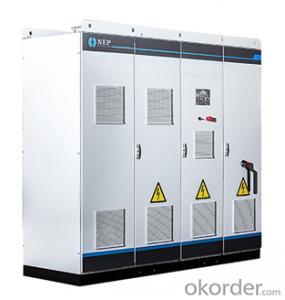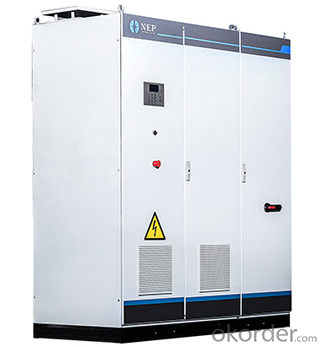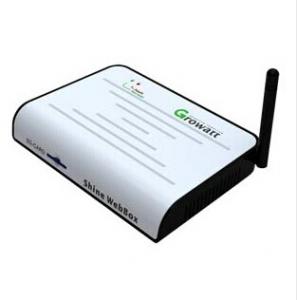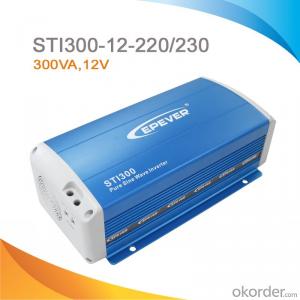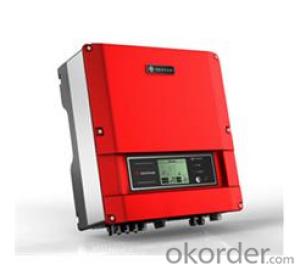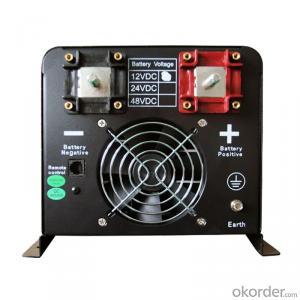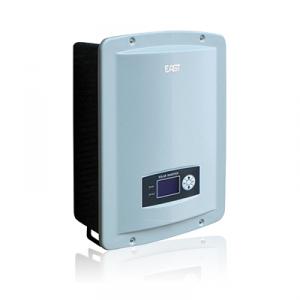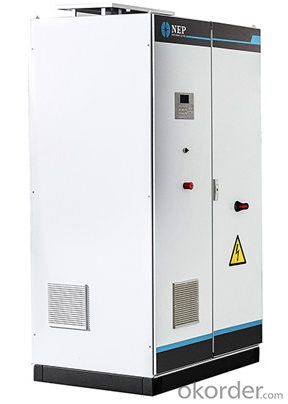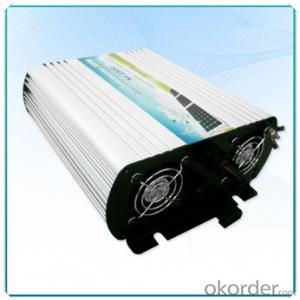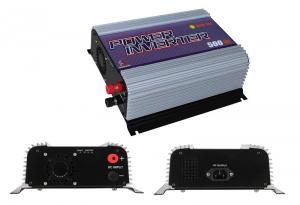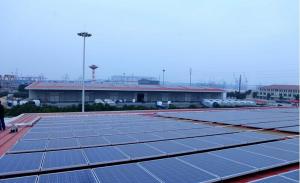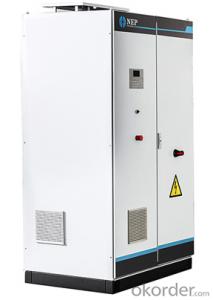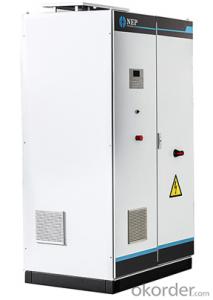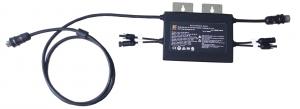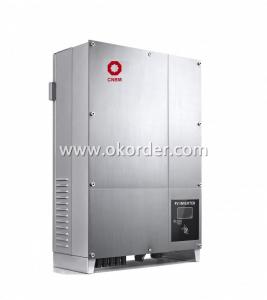500kW Grid Tied Solar Inverter BDE-500N
- Loading Port:
- Qingdao
- Payment Terms:
- TT OR LC
- Min Order Qty:
- 10 unit
- Supply Capability:
- 1000 unit/month
OKorder Service Pledge
OKorder Financial Service
You Might Also Like
Description:
A solar micro-inverter, converts direct current (DC) electricity from a single solar panel to alternating current (AC). The electric power from several micro-inverters is combined and fed into an existing electrical grid. Micro-inverters contrast with conventional string or central inverter devices, which are connected to multiple solar panels.
Characteristic & Advantages:
More Energy Harvest: Distributed MPPT allows10~25% more energy harvest
Simple: Modularized,single ac cable to the house
Reliability: Longer life time and almost 100% operation hours
Security: No high Voltage, makes safter environments
Inteligent : Monitoring each module
Savings: No dc components and significantly save labor cost
BDE-500N
★ Advanced digital control techniques using the latest DSP Optimized anti-islanding technique for the highest system reliability.
★Optimized Maximum Power Point Tracking technique guarantees the maximum power output from the PV array User oriented Graphic User Interface (GUI) on an integrated.
★ 128*64 graphic VFD and a keypad panel..
★Support multiple communication protocols, including RS232/RS485/Ethernet/Zigbee etc.
★ Complete protection functions to protect against reverse DC polarity,over temperature,over current,short cirucuit,over/under voltage,anti-islanding,etc.
★ Can be used at a wide range of environment temperatures and high altitude.
★ Automatically power-on in the morning and enter a low power mode at night. No local operators required for daily operation
- Q: Can a solar inverter be used with battery storage?
- Yes, a solar inverter can be used with battery storage. In fact, it is commonly used in solar energy systems to convert the direct current (DC) power generated by solar panels into alternating current (AC) power that can be used by household appliances or stored in batteries for later use. The solar inverter plays a crucial role in managing the flow of electricity between the solar panels, batteries, and the electrical grid, ensuring efficient energy utilization and storage.
- Q: How does a solar inverter handle harmonic distortion?
- A solar inverter handles harmonic distortion by using filters and control algorithms to reduce or eliminate the harmonics generated by the solar panels. These filters and algorithms help ensure that the electricity generated by the solar panels is clean and does not introduce any unwanted harmonics into the electrical grid.
- Q: How does a solar inverter handle power factor optimization?
- A solar inverter handles power factor optimization by continuously monitoring the power factor of the AC output and adjusting its operation accordingly. It employs various techniques such as reactive power compensation, voltage regulation, and harmonic suppression to ensure that the power factor remains close to unity, maximizing the efficiency of the solar system.
- Q: Can a solar inverter be used in areas with high altitude and low temperature conditions?
- Yes, a solar inverter can be used in areas with high altitude and low temperature conditions. However, it is important to choose a solar inverter specifically designed for such conditions, as extreme cold temperatures and high altitudes can affect the performance and efficiency of standard inverters. Specialized inverters that can withstand low temperatures and operate at high altitudes are available in the market to ensure optimal functioning of solar power systems in such environments.
- Q: What is the impact of a solar inverter on the overall system cost?
- The impact of a solar inverter on the overall system cost can be significant. A solar inverter is an essential component of a solar power system that converts the direct current (DC) generated by solar panels into alternating current (AC) that can be used to power electrical devices or be fed back into the grid. The cost of a solar inverter can vary depending on its capacity, efficiency, and brand. Generally, more advanced and efficient inverters tend to be more expensive. However, investing in a high-quality inverter can result in long-term savings and improved system performance. One important consideration is the size of the solar power system. Inverters have capacity limits, and selecting an appropriately sized inverter is crucial to optimize energy production and system efficiency. Choosing an undersized inverter can limit the system's performance, while an oversized inverter may result in unnecessary additional costs. The quality and reliability of the inverter are also important factors. A well-built and reliable inverter can minimize maintenance and repair costs, ensuring a longer lifespan for the solar power system. Additionally, advanced features like monitoring capabilities and grid integration functionalities can enhance the overall system performance and provide valuable data for maintenance and troubleshooting, but they may also increase the overall system cost. Moreover, the efficiency of a solar inverter can impact the overall system cost. Higher efficiency inverters can convert a greater amount of DC power into usable AC power, resulting in increased energy production and potentially reducing the number of solar panels required. This can lead to cost savings in terms of panel purchase and installation. In conclusion, while the cost of a solar inverter is an important consideration in overall system cost, it is crucial to balance it with factors such as capacity, efficiency, reliability, and additional features. Investing in a high-quality inverter that is appropriately sized can result in long-term savings, improved system performance, and higher energy production, ultimately maximizing the value and benefits of a solar power system.
- Q: Can a solar inverter be used with different battery chemistries?
- Yes, a solar inverter can be used with different battery chemistries as long as the voltage and capacity of the batteries are compatible with the inverter's specifications. However, it's important to note that different battery chemistries may have varying charging and discharging characteristics, so it is advisable to consult the manufacturer's guidelines to ensure optimal performance and safety.
- Q: How does a solar inverter contribute to reducing carbon emissions?
- A solar inverter contributes to reducing carbon emissions by converting the direct current (DC) electricity generated by solar panels into alternating current (AC) electricity that can be used to power homes, businesses, and the electrical grid. By enabling the efficient use of solar energy, the solar inverter reduces the reliance on fossil fuel-based electricity generation, which significantly reduces carbon emissions associated with traditional energy sources.
- Q: How does a solar inverter affect the voltage stability of a solar system?
- A solar inverter plays a crucial role in maintaining voltage stability in a solar system. It converts the direct current (DC) generated by solar panels into alternating current (AC) suitable for use in homes and businesses. By monitoring and adjusting voltage levels, a solar inverter ensures that the power output remains consistent and within acceptable limits. This helps to prevent voltage fluctuations, voltage drops, and other electrical instabilities, ensuring a stable and reliable power supply from the solar system.
- Q: What is the role of a voltage regulation feature in a solar inverter?
- The role of a voltage regulation feature in a solar inverter is to ensure that the voltage output from the solar panels is maintained at a stable and optimal level. This helps to protect the sensitive electrical components in the solar inverter and other connected devices, while also maximizing the efficiency and performance of the solar power system.
- Q: Can a solar inverter be installed indoors or outdoors?
- A solar inverter can be installed both indoors and outdoors. However, it is generally recommended to install it indoors to protect it from harsh weather conditions and extend its lifespan.
Send your message to us
500kW Grid Tied Solar Inverter BDE-500N
- Loading Port:
- Qingdao
- Payment Terms:
- TT OR LC
- Min Order Qty:
- 10 unit
- Supply Capability:
- 1000 unit/month
OKorder Service Pledge
OKorder Financial Service
Similar products
Hot products
Hot Searches
Related keywords
